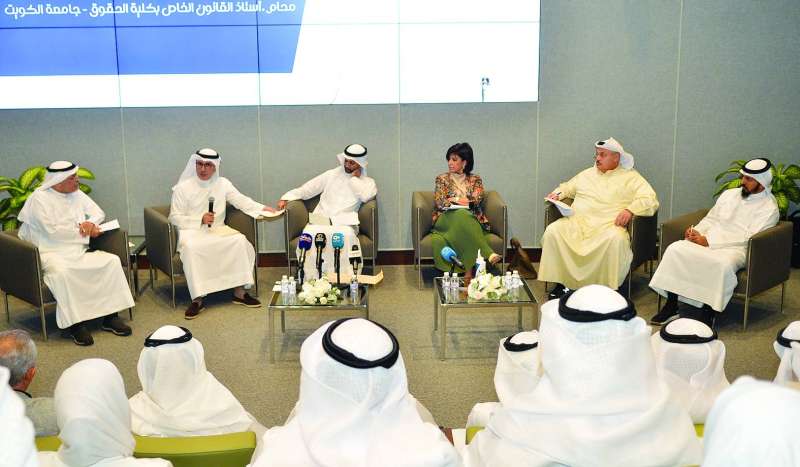Academics and media professionals considered freedom of media work a responsibility, demanding that those involved be identified in the draft media law currently being prepared by the Ministry of Information, in addition to expanding freedoms and reducing the articles of the law, and that it not be based on political whims, and that the ministry not position itself as a judiciary.
This came during a discussion organized by the Cultural Committee in the Media Department at the College of Arts at Kuwait University, under the title ‘What do we want from the media law?’ under the patronage of the Dean of the College, Dr. Abdul Mohsen Al-Madaj, at the Sabah Al-Salem University City, reports Al-Rai daily
Attending the event were the Director of Kuwait University, Dr. Fayez Al-Dhafiri; the editor-in-chief of Al-Rai, newspaper Walid Al-Jassim, and the parliamentarians, Dr. Jenan Bushehri and Hamad Al-Olayan, and a number of academics and media professionals.
The professor of private law at the Faculty of Law, Dr. Fayez Al-Kandari, described the law as “vague, boring, and long, so why do we combine 3 laws into one law. There is repetition in the provisions and wording is vague,” indicating that the law needs to be reformulated linguistically, and the chapter on election coverage must be removed, because the law of the High Electoral Commission was issued a short time ago and it is concerned with that.
He pointed out the need for “legislative craftsmanship, “which we lack. We must know the legislative purpose of any law, and this project is curious and has involved everything: elections, money laundering, and others. The law is corporeal in the sense of speech, and I hope that we will come up with a new, distinctive media law.”
In turn, columnist Iqbal Al-Ahmad said that the law is related to freedoms and is placing the Ministry of Information in the position of the judiciary, indicating that the law has a clear political spirit, and it is often a reaction, and this is what made many mistakes in it, and there is no ratio and proportionality between the penalties.
Dr. Nasser Al-Mujaybel, a faculty member in the Media Department at the College of Arts, saw the necessity of addressing previous errors and reducing the administrative burdens of prior oversight, considering that there is a legislative deficiency in monitoring the development of the media, and providing a legislative environment to control any security breaches in the media side, and to control the funding process for media institutions and those with influence, and enhancing self-censorship for media practitioners. “We need to compete in the media aspect,” he said.
As for the advisor to the Minister of Information and a member of the teaching staff in the college’s media department, Dr. Fawaz Al-Ajmi, pointed out to the need to clarify “why we want the law. In the past, we had 3 laws, and through them the media person was referred to 8 laws.”
He said that the Minister of Information was keen on laws that address the observations, and therefore the law went through three stages, and its draft was presented to the Educational Committee in the National Assembly, and we must understand that it came for one reason, which is to give media work its responsible freedom, and a special nature for the media’s work, hoping to come up with recommendations to be taken into account. taken into consideration in the draft law.
MP Dr. Jinan Bushehri, said that the draft media law “did not reach us in the media committee in the National Assembly, but rather the draft was presented to us,” stressing, “We will not accept the passage of a law that restricts freedoms. What we seek is more media freedom for all media workers,” she said, noting that the draft available today raises a very important question: “Who is this law addressed to?” Who are the media professionals addressed by this law?
MP Hamad Al-Olayan said he is happy with all the comments made on the draft law, considering that in this way it restricts freedoms, even if it contains some beautiful terms, this law contains “many articles that we will not allow to pass. Because it glorifies the authority of the ministry and the minister, and this is something we do not accept.”
He added, “The law also includes some violations in loose terms and flexible terms, which make political whims present in some penalties.”

